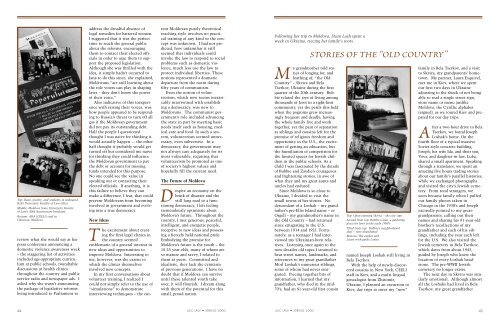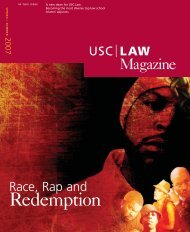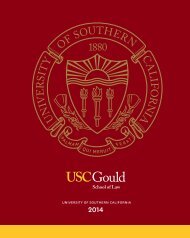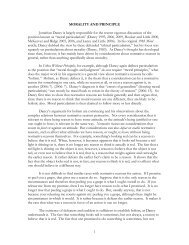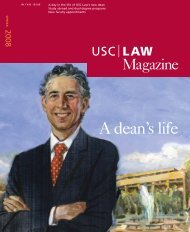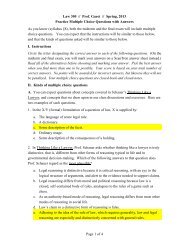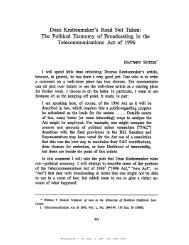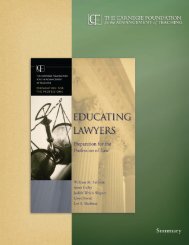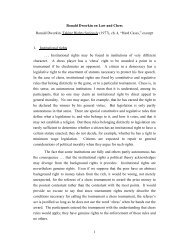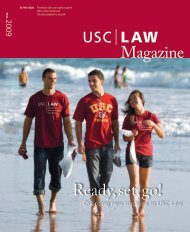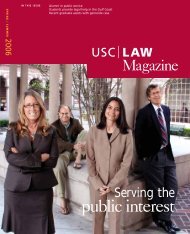Dean Scott H. Bice - USC Gould School of Law - University of ...
Dean Scott H. Bice - USC Gould School of Law - University of ...
Dean Scott H. Bice - USC Gould School of Law - University of ...
You also want an ePaper? Increase the reach of your titles
YUMPU automatically turns print PDFs into web optimized ePapers that Google loves.
Top: <strong>Dean</strong>, faculty, and students in unheatedBalti <strong>University</strong> Faculty <strong>of</strong> <strong>Law</strong> <strong>of</strong>ficeMiddle: Moldova State <strong>University</strong> Faculty<strong>of</strong> <strong>Law</strong>’s 40th Anniversary brochureBottom: ABA (CEELI) staff inChisinau, Moldovareview what she would say at herpress conference announcing adomestic violence awareness week– the staggering list <strong>of</strong> activitiesincluded age-appropriate curriculumat public schools, roundtablediscussions at health clinicsthroughout the country and publicservice radio and newspaper ads. Iasked why she wasn’t announcingthe package <strong>of</strong> legislative reformsbeing introduced to Parliament toaddress the dreadful absence <strong>of</strong>legal remedies for battered women.I suggested that it was the perfecttime to reach the general publicabout the reforms, encouragingthem to contact their elected <strong>of</strong>ficialsin order to urge them to supportthe proposed legislation.Although she was thrilled with theidea, it simply hadn’t occurred toJana to do this since, she explained,Moldovans “are still learning aboutthe role voters can play in shapinglaws – they don’t know the power<strong>of</strong> their voice.”Also indicative <strong>of</strong> this inexperiencewith raising their voices, washow people appeared to be respondingto Russia’s threat to turn <strong>of</strong>f allgas if the Moldovan governmentdid not pay its outstanding debt.Half the people I questionedthought I was naive for thinking itwould actually happen — the otherhalf thought it probably would getturned <strong>of</strong>f but considered me naivefor thinking they could influencethe Moldovan government to paythe debt or account for missingfunds intended for this purpose.No one could see the value inspeaking out or contacting theirelected <strong>of</strong>ficials. If anything, it isthis failure to believe they canmake a difference, I fear, that couldprevent Moldovans from becominginvolved in government and evolvinginto a true democracy.New IdeasThe excitement about creatingthe first legal clinics inthe country seemedemblematic <strong>of</strong> a general interest innew ideas and opportunities toimprove Moldova. Interesting tome, however, was the extent towhich the clinics themselvesinvolved new concepts.In my first conversations aboutvolunteer training, I realized Icould not simply refer to the use <strong>of</strong>“simulations” to demonstrateinterviewing techniques – the currentMoldovan purely theoreticalteaching style involves no practicaltraining <strong>of</strong> any kind so the conceptwas unknown. I had not predicted,how unfamiliar it stillseemed that individuals couldinvoke the law to respond to socialproblems such as domestic violence,much less use the law toprotect individual liberties. Thesenotions represented a dramaticdeparture from the norm duringfifty years <strong>of</strong> communism.Even the notion <strong>of</strong> volunteerism,which now seems inextricablyintertwined with establishinga democracy, was new toMoldovans. The communist government’srole included advancingthe state in part by meeting basicneeds itself such as housing, medicalcare and food. In such a system,volunteerism seemed unnecessary,even subversive. In ademocracy, the government maynot always care adequately for itsmost vulnerable, requiring thatvolunteerism be promoted as one<strong>of</strong> society’s highest values andhopefully fill the current need.The Future <strong>of</strong> MoldovaDespite an economy on thebrink <strong>of</strong> disaster and thestill long road to a functioningdemocracy, I left feelingtremendously optimistic aboutMoldova’s future. Throughout thecountry, I met generous, peaceful,intelligent, and energetic people,receptive to new ideas and possessinga fiercely held national pride.Embodying the promise forMoldova’s future is the youth – the18-25 year-olds, many <strong>of</strong> whom areso mature and savvy, I related tothem as peers. Committed andidealistic, they lack the cynicism<strong>of</strong> previous generations. I have nodoubt that if Moldova can surviveuntil these talented youth takeover, it will flourish. I dream alongwith them <strong>of</strong> the potential for thissmall, proud nation.Following her trip to Moldova, <strong>Dean</strong> Lash spent aweek in Ukraine, tracing her family’s roots.My grandmother told stories<strong>of</strong> longing for, andloathing <strong>of</strong>, “the OldCountry” – Skvira and BelaTserkov, Ukraine during the firstquarter <strong>of</strong> the 20th century. Bubbierelated the joys <strong>of</strong> living amongthousands <strong>of</strong> Jews in a tight-knitcommunity, yet the perils this heldwhen the pogroms grew increasinglyfrequent and deadly; havingthe whole family live and worktogether, yet the pain <strong>of</strong> separationas siblings and cousins left for thepromise <strong>of</strong> religious freedom andopportunity in the U.S.; the excitement<strong>of</strong> getting an education, butthe humiliation <strong>of</strong> competition forthe limited spaces for Jewish childrenin the public schools. As achild I was fascinated by the details<strong>of</strong> Bubbie and Zaydie’s courageousand frightening stories, in awe <strong>of</strong>what they and my great aunts anduncles had endured.Since Moldova is so close toUkraine, I decided to visit thesmall towns <strong>of</strong> her stories. Nodescendant <strong>of</strong> a Loshak – my grandfather’spre-Ellis Island name – orOrgell – my grandmother’s name inthe Old Country – had returnedsince emigrating to the U.S.between 1914 and 1921. Fortunately,as a teenager I had interviewedmy Ukrainian-born relatives.Listening once again to thenow decades old tapes I strained tohear street names, landmarks, andreferences to my great grandfatherMotl Loshak’s numerous siblings,some <strong>of</strong> whom had never emigrated.Piecing together bits <strong>of</strong>information, I learned that mygrandfather, who died in the mid-70’s, had an 81-year-old first cousinSTORIES OF THE “OLD COUNTRY”Top: Upon entering Skivra -- the city signSecond from top: Bubbie’s lake, a gatheringplace for Jews in the early 1900’sThird from top: Bubbie’s neighborhoodshul -- now abandonedBottom: The author andLaura with guide Larisanamed Joseph Loshak still living inBela Tserkov.With the help <strong>of</strong> newly-discoveredcousins in New York, CEELIstaff in Kiev, and a multi-lingualgenealogist from Zhitomir,Ukraine, I planned an excursion toKiev, day trips to meet my “new”family in Bela Tserkov, and a visitto Skvira, my grandparents’ hometown.My partner, Laura Esquivel,met me in Kiev, where we spentour first two days in Ukraineadjusting to the shock <strong>of</strong> not beingable to read a single street sign,store name or menu (unlikeMoldova, the Cyrillic alphabetreigned), as we toured Kiev and preparedfor our day trips.After a two-hour drive to BelaTserkov, we found JosephLoshak’s home. On thefourth floor <strong>of</strong> a typical massiveSoviet-style concrete building,Joseph, his wife Ida, and their son,Vova, and daughter-in-law, Luba,shared a small apartment. Speakingthrough a translator, we spent anamazing five hours trading storiesabout our family’s parallel histories,while we exchanged photographsand visited the city’s Jewish cemetery.From total strangers, wesoon became family when I pulledout family photos taken inChicago in the 1930’s and Josephexcitedly pointed to my greatgrandparents,calling out theirnames and sharing his 91-year-oldbrother’s recollections <strong>of</strong> mygrandfather and each <strong>of</strong> his siblings,including the year each leftfor the U.S. We also visited theJewish cemetery in Bela Tserkov,which dates from about 1945,guided by Joseph who knew thelocation <strong>of</strong> every Loshak headstone.The pre-WWII Jewishcemetery no longer exists.The next day in Skvira was similarlyemotional. Although almostall the Loshaks had lived in BelaTserkov, my great grandfather44 <strong>USC</strong> LAW • SPRING 2000<strong>USC</strong> LAW • SPRING 200045


